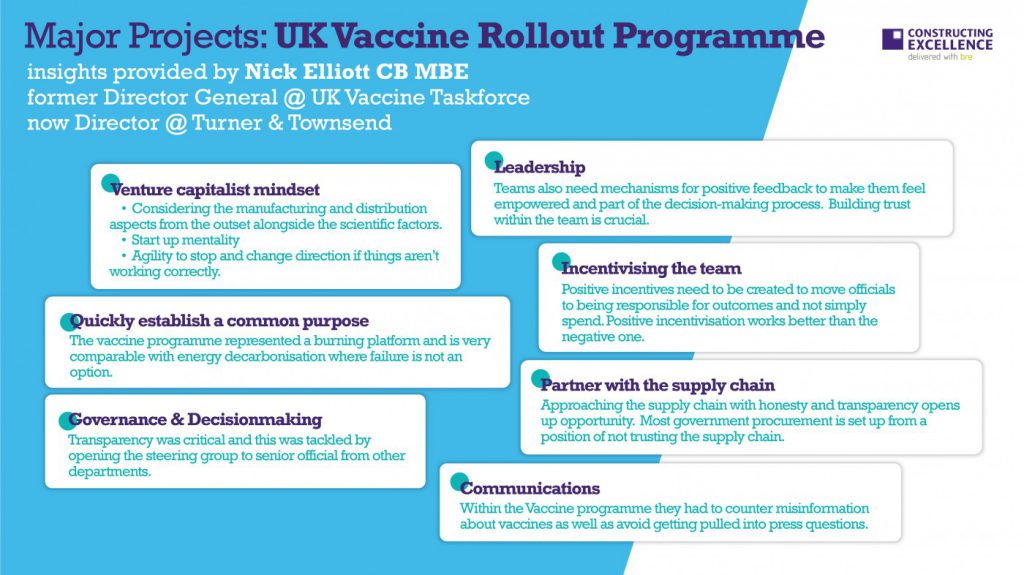On the 14th of July, the CE Major Projects Group was treated to a behind-the-scenes look at the Vaccine Taskforce with a presentation from Nick Elliott, CB MBE – former Director-General of the UK Vaccine Taskforce now Director at Turner & Townsend. There are significant similarities and learning points for major infrastructure projects.
Most vaccine projects fail, so the odds were very much stacked up against this particular vaccine programme. There was no guarantee that it would work and no political confidence. However, this provided a certain amount of breathing room for the programme in its early stages. At the same time, test and trace got all the money and indeed all political and media scrutiny. Here are some of the key learning points:
Venture capitalist mindset
Kate Bingham brought a Venture Capitalist mindset to the programme. It brought some different approaches to traditional government programmes this included:
· Considering the manufacturing and distribution aspects from the outset alongside the scientific factors.
· Start up mentality – not outsourcing as is common in government programmes but people bringing people they knew and trusted with the skillsets to deliver.
· Agility to stop and change direction if things aren’t working correctly.
Quickly establish a common purpose
The programme’s success was not just the technical success of the vaccine, but the goal was also the number and rate of vaccinations. Effectively getting the population vaccinated as quickly as possible was the main focus. The vaccine programme represented a burning platform comparable with energy decarbonisation, where failure is not an option. It is essential to recognise that behavioural change is fundamentally crucial in enabling the acceptance of a solution.
Leadership
Inspirational leadership needs an operational counterpart to make things happen. Teams also need mechanisms for positive feedback to make them feel empowered and part of the decision-making process. Finally, building trust within the team is crucial.
Incentivising the team
Particularly in government projects, we need to move from ‘not making a mistake’ to ‘doing the right thing’. There is often a fear of getting the process wrong; however, the current processes can add considerable hidden costs to the project. Positive incentives need to be created to move officials to be responsible for outcomes and not simply spend. Positive incentivisation works better than a negative one.
Governance & decision-making
The Taskforce still had to operate within government processes and governance. The Taskforce was based in BEIS but given the breadth and significance of the programme had to bring in stakeholders from multiple government departments. Transparency was critical, and it was tackled by opening the steering group to senior officials from other departments.
Fast and effective decision-making was achieved by establishing a Steering Group that met three times a week and involved key stakeholders. This enabled agile governance, and the fastest deal was concluded in one week.
Partner with the supply chain
It is said clients get the supply chain they deserve. If you distrust the supply chain, they will distrust you. Approaching the supply chain with honesty and transparency opens up opportunities. Most government procurement is set up from a position of not trusting the supply chain. The EU took a hard commercial position, viewed the vaccine like a commodity procurement and treated it like any other procurement exercise. The UK got a high share of Pfizer jabs because it collaborated early with the supplier and gave them the confidence to deliver their product effectively at the low temperatures required and minimise wastage.
Communications
Planning in a communication team from the outset is very important when the inevitable political and press scrutiny comes, which places undue pressure and anxiety on the team.
Within the Vaccine programme, they had to counter misinformation about vaccines and avoid getting pulled into press questions. This can be counterproductive and take focus away from delivery. Major Projects group needs to accept that this is inevitable and needs a plan to deal with it.
Bring in the right people at the right time
Although BEIS led the development programme, the Department of Health was responsible for the vaccine deployment to build trust with the public and link with existing patient systems and records.
Legacy
The programme carefully considered maximising existing UK capability and building legacy capability for booster jabs and future vaccines.
Top 3 success factors:
· Good leadership
· Effective governance
· Burning platform
There are certainly a lot of learning points from the programme that can be applied in major projects. The group will meet again on the 21st of September, 16.00 – 17.30, to look at how these learning outcomes can be practically applied to major projects.




Comments are closed.